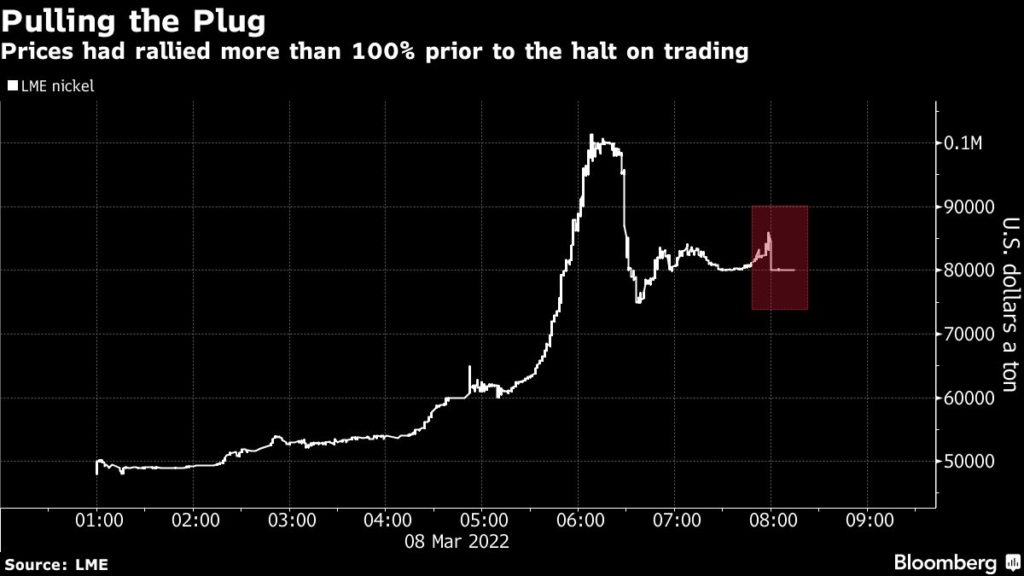
The London Metal Exchange’s suspension of nickel trading after soaring prices left brokers facing huge margin calls has also upended the market for a key industrial commodity.
Nickel is a key ingredient in stainless steel and electric-vehicle batteries, and the LME sets benchmark prices for the global industry. But in recent years many consumers have come to favor other raw materials over the refined metal that underpins the bourse’s contracts, leaving them as largely passive observers of this week’s market meltdown.
“It’s like an iceberg, you’ve got the top trade-able above the surface, but there’s a whole lot of material beneath that pricing off it,” said Peter Hannah a commodities price development manager at Fastmarkets in Singapore. “And you can’t get those units onto the LME to ease a squeeze, they’re just passengers on the vehicle.”

China, which has world’s biggest stainless steel and electric-vehicle battery industries, felt the impact immediately.
Chinese producers of nickel sulfate — used in EV batteries — stopped offering product due to the lack of price visibility, said Susan Zou, an analyst at Rystad Energy in Shanghai. That’s raising concerns about a physical metal market that’s expected to tighten as EVs displace the combustion engine.
“Right now, given the volatility of nickel prices, whether the automakers still have confidence to develop their nickel rich battery driven business models is in question,” said Zou. “If the nickel price can be chaotic today, maybe it can also be in the future, when there’s a definite deficit forecast.”
Concerns over potential disruptions to Russian supply combined with a mammoth short bet by Chinese tycoon Xiang Guangda propelled nickel to a 250% gain in two days. Before LME trading was halted on Tuesday morning, a huge disconnect emerged with Shanghai contracts, where maximum daily gains and losses are capped. Prices in Shanghai pared their advance on Thursday and Friday, but the fallout from the nickel squeeze is reverberating far beyond China.
Spanish stainless steel manufacturer Acerinox halted new orders of nickel on Thursday. The company said it couldn’t allow “soaring prices to be incorporated into the purchase prices of nickel and scrap,” and that such increases ran the risk of “breaking the market.”
The widening impact highlights the underlying complexity of the nickel market. The benchmark LME contract is only for so-called Class 1 nickel — with a minimum purity of 99.8% — but that accounts for less than a quarter of total finished supply.
While battery makers use nickel sulfate, stainless steelmakers mainly utilize nickel pig iron, a cheaper product a pioneered in 2007 by Guangda’s Tsinghsan Holding Group Co. Under pressure from soaring prices, the Chinese company came up with a way to use nickel pig iron from massive deposits in Indonesia, unleashing a low-grade substitute.
